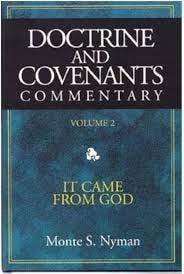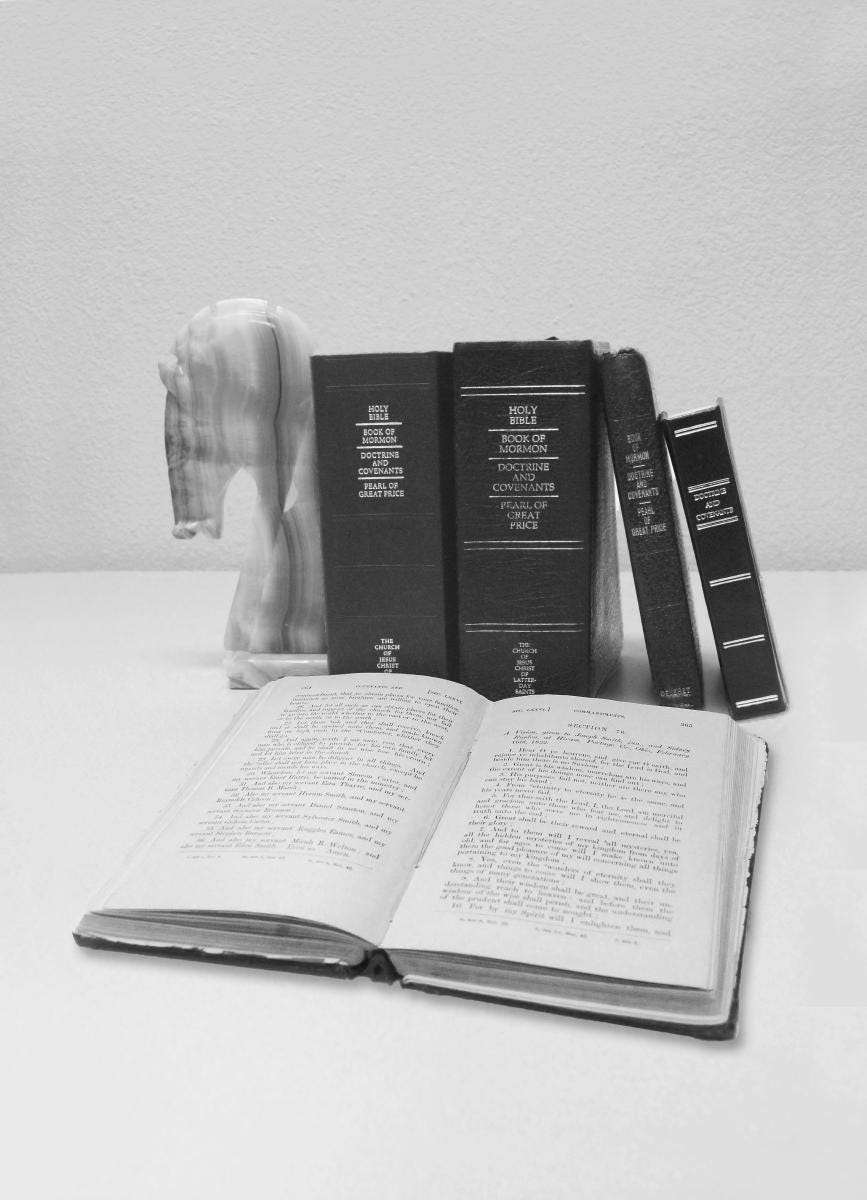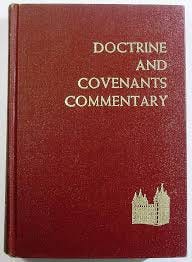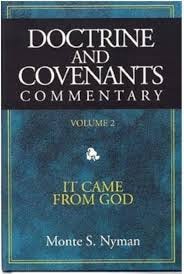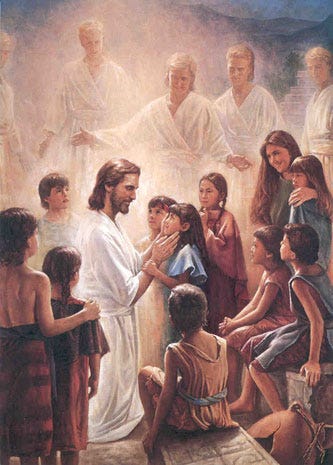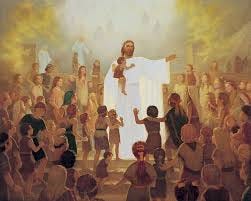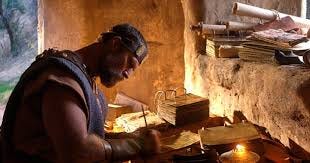Little Children are Holy
Historical Background and Reflections on Doctrine and Covenants Section 74
What is the historical background for Doctrine and Covenants Section 74?
Oddly enough, the authors of the LDS Come Follow Me Manual skip right over this section. Why?
In their Doctrine and Covenants Commentary, Smith and Sjodahl introduce this section as follows:
Complying with the instructions in the previous Section, the Prophet Joseph resumed his Bible studies, whereupon he received this Revelation. The central thought expressed here is found in the first and last verses, and may be stated thus: Little children, sanctified through the atonement of Jesus Christ, are holy.
Two conclusions follow from this proposition. The first, fully set forth in this Revelation, is, that little children do not need circumcision to become sanctified, as taught by the adherents of the Mosaic faith. The second is equally important, that is, little children are holy being sanctified through the atonement of Jesus Christ.
In the Corinthian Church, some evidently held that when the husband, or wife, had been converted, he, or she, ought to abandon the unconverted partner as unclean and contaminating. Not at all! St. Paul says, in substance, that the conversion of one of the partners has brought a sanctifying influence into the family. As Meyer puts it, “The non-believing partner in a marriage *** becomes partaker - as if by sacred contagion - of the higher, divinely consecrated character of his consort.” “Else,” the Apostle argues, “were your children unclean.” If the wife - this is the argument - must abandon a husband because he is not a Church member, she would also be obliged to abandon her children. But this is not required.
The consecration of the believing parent includes the children. They are sanctified through the atonement of our Lord. They need no ordinance, until they arrive at the age of accountability, when they should be baptized, after proper instruction. Christians were forbidden to marry outside the Church (II. Cor. 6:14), but marriages contracted before conversion were not to be broken up, if the unconverted partner desired to continue the marriage relation. (p. 432)
In his book The Revelations of the Prophet Joseph Smith, Lyndon W. Cook introduces this section as follows:
Date. January 1832 (after 10 January and before 25 January. See Historical Note.).
Place. Hiram, Portage County, Ohio.
Historical Note. Section 73, received 10 January 1832, had commanded Joseph Smith and Sidney Rigdon to resume the translation of the Bible. They had done so. While no available statement definitely connects section 74 with the translation of the Bible, the implication is certainly very strong: Section 74 is an explanation of 1 Cor. 7:14.
Publication Note. Section 74 was first published as section 73 in the 1835 edition of the Doctrine and Covenants.
This is Bruce R. McConkie’s section heading for this section:
Revelation given to Joseph Smith the Prophet, at Wayne County, New York, in 1830. Even before the organization of the Church, questions had arisen about the proper mode of baptism, leading the Prophet to seek answers on the subject. Joseph Smith’s history states that this revelation is an explanation of 1 Corinthians 7:14, a scripture that had often been used to justify infant baptism.
The Prophet Joseph Smith himself introduced this section as follows:
Upon the reception of the foregoing word of the Lord [Section 73], I recommenced the translation of the Scriptures, and labored diligently until just before the conference, which was to convene on the 25th of January. During this period, I also received the following, as an explanation of the First Epistle to the Corinthians, 7th chapter, 14th verse [Section 74, follows.] (HC 1:242, January 1832, Hiram, Ohio.) (Roy W. Doxey, Latter-day Prophets and the Doctrine & Covenants, Vol. I., p. 565, See also Monte S. Nyman, Doctrine and Covenants Commentary, Vol. 2, p. 21)
Nyman adds a note to the Prophet’s introduction:
The Apostle Peter acknowledged that in the Apostle Paul’s writings “are some things hard to be understood” (2 Peter 3:15-16.) Apparently Joseph Smith was finding it difficult to interpret Paul as he was translating, and the Lord gave him a detailed explanation of this verse: 1 Corinthians 7:14 (quoted in D&C 74:1). (p. 21)
With this historical background in mind, let’s examine and appreciate the revelation itself:
For the unbelieving husband is sanctified by the wife, and the unbelieving wife is sanctified by the husband; else were your children unclean, but now are they holy.
Now, in the days of the apostles the law of circumcision was had among all the Jews who believed not the gospel of Jesus Christ.
And it came to pass that there arose a great contention among the people concerning the law of circumcision, for the unbelieving husband was desirous that his children should be circumcised and become subject to the law of Moses, which law was fulfilled.
And it came to pass that the children, being brought up in subjection to the law of Moses, gave heed to the traditions of their fathers and believed not the gospel of Christ, wherein they became unholy.
Wherefore, for this cause the apostle wrote unto the church, giving unto them a commandment, not of the Lord, but of himself, that a believer should not be united to an unbeliever; except the law of Moses should be done away among them,
That their children might remain without circumcision; and that the tradition might be done away, which saith that little children are unholy; for it was had among the Jews;
But little children are holy, being sanctified through the atonement of Jesus Christ; and this is what the scriptures mean. (D&C 74:1-7)
Paul counseled the Church of his day not to keep the law of Moses. Little children are holy and are sanctified through the Atonement of Jesus Christ. The Lord Himself and the Holy Ghost are the best interpreters of scripture. Because he held the keys of the mysteries of the Kingdom, and because he had authority from God for the Church, Joseph Smith was able to translate and interpret scripture in the Lord’s way and by the same Spirit in which the scripture was first given. Sadly, during the time of Christ or the days of the apostles, many Jews adhered to a wicked tradition that uncircumcised children were unholy. Such is a grievously false doctrine. Smith and Sjodahl explain:
Among all the Jews] Corinth was a Grecian city, the most considerable in the country of the Hellenes at the time Paul visited the place, but there were also many Jews, living there in exile, in consequence of a decree issued by Emperor Claudius (Acts 18:2), expelling the Hebrews from Rome. Some of them had joined the Church. This accounts for a controversy, in a Greek city, concerning a Mosaic rite (v. 3). (p. 432)
Nyman’s commentary on this section is even more helpful:
Circumcision is first mentioned in the Bible when God commanded Abraham to circumcise every male child when he was eight days old (see Genesis 17:10-12). However, as Joseph had translated this Genesis chapter, he was given much more information concerning the meaning of the original text.
11 And I will established a covenant of circumcision with thee, and it shall be my covenant between me and thee, and thy seed after thee, in their generations; that thou mayest know for ever that children are not accountable before me until they are eight years old.
12 And thou shalt observe to keep all my covenants wherein I covenanted with thy fathers; and thou shalt keep the commandments which I have given thee with mine own mouth, and I will be a God unto thee and thy seed after thee. [JST, Genesis 17:11-12; italics show additions to the text]
The controversy among the Jewish people, at the time of the New Testament Apostles (D&C 74:3-4), is further evidence of the apostate condition they were in. The tradition that little children were unholy (v. 6) was a part of the infant baptism doctrine that later crept into the Christian apostasy that followed, and is still prevalent today. It was the same false doctrine that led God to give the above revelation to Abraham (see JST, Genesis 17:1-9). The same false doctrine led Mormon to write his missionary son, Moroni, concerning the mockery of baptizing little children because little children were alive in Christ (see Moroni 8). The revelation to Joseph validates Mormon’s epistle.
Another tradition in the Christian world is that the ordinance of baptism replaced circumcision when the law of Moses was fulfilled. The Prophet Joseph refuted this concept: “Circumcision is not baptism, neither was baptism instituted in the place of circumcision. Baptism is for the remission of sins. Children have no sins. JEsus blessed them and said, ‘Do what you have seen me do.’ Children are made alive in Christ, and those of riper years through faith and repentance” (TPJS, 314).
The Apostle Paul knew he could not speak for the whole Church (see D&C 74:5), but as one of the Twelve Apostles he could write “by wisdom” (D&C 28:5). Thus he advised against uniting in marriage with an unbeliever unless the law of Moses was done away; or they agreed that their children would not be considered unholy and be circumcised under the law of Moses (D&C 74:6). Wherefore, we have three witnesses that little children are not to be baptized until they are accountable: the JST (Genesis 17), the Book of Mormon (Moroni 8), and the Doctrine and Covenants (68:25; 74:6-7). With these additional witnesses we can understand what Paul was writing to the Corinthian Saints. (Monte S. Nyman, Doctrine and Covenants Commentary, Vol. 2, pp. 22-23)
Especially with regard to how we treat little children, make no mistake: the Lord will not be mocked. Little children are precious and holy, and the Lord’s love for them is evident throughout scripture:
And they brought young children to him, that he should touch them: and his disciples rebuked those that brought them.
But when Jesus saw it, he was much displeased, and said unto them, Suffer the little children to come unto me, and forbid them not: for of such is the kingdom of God.
Verily I say unto you, Whosoever shall not receive the kingdom of God as a little child, he shall not enter therein.
And he took them up in his arms, put his hands upon them, and blessed them. (Mark 10:13-16)
and
At the same time came the disciples unto Jesus, saying, Who is the greatest in the kingdom of heaven?
And Jesus called a little child unto him, and set him in the midst of them,
And said, Verily I say unto you, Except ye be converted, and become as little children, ye shall not enter into the kingdom of heaven.
Whosoever therefore shall humble himself as this little child, the same is greatest in the kingdom of heaven.
And whoso shall receive one such little child in my name receiveth me.
But whoso shall offend one of these little ones which believe in me, it were better for him that a millstone were hanged about his neck, and that he were drowned in the depth of the sea. (Matthew 18:1-6)
and
And it came to pass that he commanded that their little children should be brought.
So they brought their little children and set them down upon the ground round about him, and Jesus stood in the midst; and the multitude gave way till they had all been brought unto him.
And it came to pass that when they had all been brought, and Jesus stood in the midst, he commanded the multitude that they should kneel down upon the ground.
And it came to pass that when they had knelt upon the ground, Jesus groaned within himself, and said: Father, I am troubled because of the wickedness of the people of the house of Israel.
And when he had said these words, he himself also knelt upon the earth; and behold he prayed unto the Father, and the things which he prayed cannot be written, and the multitude did bear record who heard him.
And after this manner do they bear record: The eye hath never seen, neither hath the ear heard, before, so great and marvelous things as we saw and heard Jesus speak unto the Father;
And no tongue can speak, neither can there be written by any man, neither can the hearts of men conceive so great and marvelous things as we both saw and heard Jesus speak; and no one can conceive of the joy which filled our souls at the time we heard him pray for us unto the Father.
And it came to pass that when Jesus had made an end of praying unto the Father, he arose; but so great was the joy of the multitude that they were overcome.
And it came to pass that Jesus spake unto them, and bade them arise.
And they arose from the earth, and he said unto them: Blessed are ye because of your faith. And now behold, my joy is full.
And when he had said these words, he wept, and the multitude bare record of it, and he took their little children, one by one, and blessed them, and prayed unto the Father for them.
And when he had done this he wept again;
And he spake unto the multitude, and said unto them: Behold your little ones.
And as they looked to behold they cast their eyes towards heaven, and they saw the heavens open, and they saw angels descending out of heaven as it were in the midst of fire; and they came down and encircled those little ones about, and they were encircled about with fire; and the angels did minister unto them. (3 Nephi 17:11-24)
Mormon, the main prophetic author and editor of the Book of Mormon, was also filled with charity and love for little children, which love he expressed in one of his epistles to his faithful son Moroni:
Listen to the words of Christ, your Redeemer, your Lord and your God. Behold, I came into the world not to call the righteous but sinners to repentance; the whole need no physician, but they that are sick; wherefore, little children are whole, for they are not capable of committing sin; wherefore the curse of Adam is taken from them in me, that it hath no power over them; and the law of circumcision is done away in me.
And after this manner did the Holy Ghost manifest the word of God unto me; wherefore, my beloved son, I know that it is solemn mockery before God, that ye should baptize little children.
Behold I say unto you that this thing shall ye teach—repentance and baptism unto those who are accountable and capable of committing sin; yea, teach parents that they must repent and be baptized, and humble themselves as their little children, and they shall all be saved with their little children.
And their little children need no repentance, neither baptism. Behold, baptism is unto repentance to the fulfilling the commandments unto the remission of sins.
But little children are alive in Christ, even from the foundation of the world; if not so, God is a partial God, and also a changeable God, and a respecter to persons; for how many little children have died without baptism!
Wherefore, if little children could not be saved without baptism, these must have gone to an endless hell.
Behold I say unto you, that he that supposeth that little children need baptism is in the gall of bitterness and in the bonds of iniquity; for he hath neither faith, hope, nor charity; wherefore, should he be cut off while in the thought, he must go down to hell.
For awful is the wickedness to suppose that God saveth one child because of baptism, and the other must perish because he hath no baptism.
Wo be unto them that shall pervert the ways of the Lord after this manner, for they shall perish except they repent. Behold, I speak with boldness, having authority from God; and I fear not what man can do; for perfect love casteth out all fear.
And I am filled with charity, which is everlasting love; wherefore, all children are alike unto me; wherefore, I love little children with a perfect love; and they are all alike and partakers of salvation. (Moroni 8:8-17)
Like Mormon, Joseph Smith spoke and wrote with boldness, having authority from God. With perfect love that casts out all fear, the Prophet Joseph Smith dictated the revelation that is now contained in D&C 74, adding another witness to the truth that little children are holy, sanctified through the Atonement of Jesus Christ. They are alive in Christ, and the false doctrine of infant or child baptism is an abomination that must be done away.










